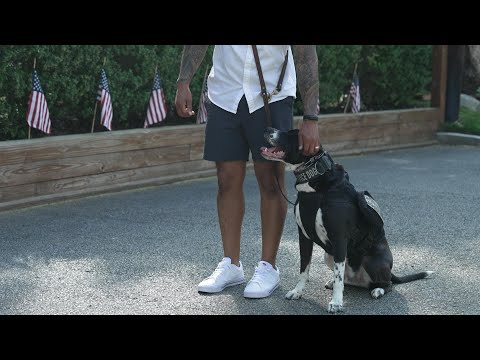(4 Jun 2024)
RESTRICTION SUMMARY:
ASSOCIATED PRESS
Kearny, New Jersey – 3 June 2024
1. Doc, a pointer-black lab mix, laying on the kitchen floor
2. Doc walking in the kitchen
3. Wide of Dave Crenshaw and his family at the kitchen counter
4. Medium of Crenshaw speaking with his daughters
5. Tight of Crenshaw listening to his daughters
6. SOUNDBITE (English) Dave Crenshaw, Iraq War Veteran:
“One of the issues when you’re suffering from PTSD is having isolation. You don’t want to deal with the public. You don’t want to be out there for various different reasons. It’s different from veteran to veteran. For me, it just — I felt in my safe space being at home. But obviously you can’t live like that. You need to be able to reintegrate into society.”
7. Crenshaw petting Doc in his living room
8. Closeup of Crenshaw petting Doc
SOUNDBITE (English) Dave Crenshaw, Iraq War Veteran:
“I call him an early warning detection system because now that he was in the house, any little thing that he would have heard, he would have gotten up and he would have alerted me. So now I can sleep better at night. I don’t have to worry about the insomnia – well, am I going to get attacked? Is this going to happen? Am I going to have a night terror and not be able to get out of it? And Doc, knowing he was beside my bed, it gave me that opportunity of peace and ease to be able to have a good night’s sleep.”
9. Crenshaw putting on Doc’s service dog vest
10. Closeup of Crenshaw putting vest on Doc
ASSOCIATED PRESS
New York – 31 May 2024
11. SOUNDBITE (English) Maggie O’Haire, Professor at University of Arizona College of Veterinary Medicine:
“We know that veterans with PTSD are struggling. They face high rates of depression, anxiety. Their body is exhausted from the hypervigilance that they are facing. Those with a service dog appear to be struggling less — to have less of that anxiety, and it may help to un-regulate from those stress and anxiety symptoms to function in their everyday life.”
ASSOCIATED PRESS
Kearny, New Jersey – 3 June 2024
12. Crenshaw practicing commands with Doc outside their home
13. Crenshaw playing with Doc as his daughters watch
ASSOCIATED PRESS
New York – 31 May 2024
14. SOUNDBITE (English) Maggie O’Haire, Professor at University of Arizona College of Veterinary Medicine:
“It’s not intended to be a standalone treatment to cure PTSD on its own. It’s intended to help veterans struggle less. And that’s really what the data is showing is that they are exhibiting less PTSD symptoms. Whether or not that means that they have remission from PTSD varies by individual, but by and large it’s about struggling less."
ASSOCIATED PRESS
Kearny, New Jersey – 3 June 2024
15. Crenshaw and his family sitting on their front porch
16. Closeup of Crenshaw
17. Closeup of Doc
ASSOCIATED PRESS
New York – 31 May 2024
18. SOUNDBITE (English) Maggie O’Haire, Professor at University of Arizona College of Veterinary Medicine:
“The VA is the primary body that determines what treatments are evidence based, which treatments are recommended. Currently, service dogs are listed as not having enough clinical evidence to be supported and listed in this manner. And that’s one of the reasons that we wanted to conduct this study, is to bring evidence behind a practice that appears to be increasingly popular, yet historically did not have the scientific base behind it."
ASSOCIATED PRESS
Kearny, New Jersey – 3 June 2024
19. Various photos in Crenshaw’s home
20. Closeup of Crenshaw’s army combat helmet
22. SOUNDBITE (English) Dave Crenshaw, Iraq War Veteran:
Find out more about AP Archive: http://www.aparchive.com/HowWeWork
Twitter: https://twitter.com/AP_Archive
Facebook: https://www.facebook.com/APArchives
Instagram: https://www.instagram.com/APNews/
You can license this story through AP Archive: http://www.aparchive.com/metadata/youtube/98b95bb15d26405a85c2608c69ea5066





